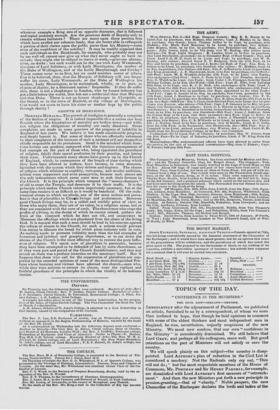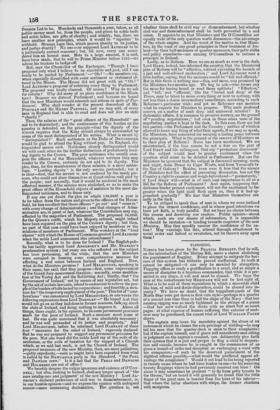TOPICS OF THE DAY.
"CONFIDENCE IN THE MINISTERS."
THE CIVIL LIST-.-IRELAND-HEFOHII.
IMMEDIATELY after the adjournment of Parliament, we published an article, furnished to us by a correspondent, of whom we were then inclined to hope, that though he held opinions in common with some of the ablest thinkers and most independent men in England, he was, nevertheless, unjustly suspicious of the new Ministry. We must now confess, that our own "confidence in the Ministry" is considerably diminished. We still believe that Lord GREY, and perhaps all his colleagues, mean well. But good intentions on the part of Ministers will not satisfy or save the country.
We will speak plainly on this subject-the country is disap- pointed. Lord ALTHORP'S plan of reduction in the Civil List is considered a mockery. Not the Radicals only cry out, "This will not do ; " but the most respectable members of the House of Commons, Mr. PORTMAN and Sir HENRY PARNELL, for example, are dissatisfied with Lord AurnouP's first measure of "retrench- ment." And then the new Ministers put forth a new principle in pension-granting,-that of "charity." Noble paupers, the new Chancellor of the Exchequer declares the lords and ladies of the Pension List to be. Hundreds and -thousands a.year, taken, as all public money must be, from the people, and given to noble lords and noble ladies, are gifts of charity; and charity, too, (here we have another new principle), which it would be " injustice " to withhold. Strange logic this, which proves charity to be justice, and justice charity! No one ever supposed Lord ALTHORP to be a particularly correct reasoner ; but, till now, every one consi- dered him an honest man. Bets to a large amount, it is said, have been made, that he will be Prime Minister before 1832—we advise his backers to hedge off'. But, says the Chancellor of the Exchequer, "Though I have proposed only what I believe to be charitable and just, still I am ready to be guided by Parliament."—" Oh! "—So members ciy, when especially dissatisfied with some sentiment or statement ut- tered in the House. The House did not greet with an " Oh ! Lord ALTHORP'S proposal of referring every thing to Parliament.- The proposal was loudly cheered. Of course ! Why do we ask for reform ? Why did many of us place confidence in the Minis- ters? Because we distrust Parliament ; and because we hoped that the new Ministers would retrench and reform in spite of Par- liament. Who shall wonder at the present discontent of Mr. PORTMAN and Sir Hurray PARNELL, and we may add, of every man in England that is able to read and does not live on state " charity ?" Then, the salaries of the "great officers of the Household" are not to be diminished; and the continuance of this burden on the country is defended on the principle—that the dignity of the Crown requires that the King should always be surrounded by some of the most distinguished ofhis nobles. What is meant by " distinguished ?" Such noblemen as the Duke of DEVONSHIRE would be glad to attend the King without pay. In England, dis- tinguished means rich. Noblemen already distinguished would vie with each other for the further distinction of gratuitously lend- ing dignity to the Crown. The poor noblemen who usually com- pose the officers of the Household, whatever services they may render to the Crown, certainly do not add to its dignity. The plea, then, for the maintenance of these salaries, is a mere subter- fuge. "Lending dignity" is the only service pretended ; but it is clear—first, that the service is not rendered by the needy per- sons, who could not show themselves at Court unless well paid by the people; and secondly, that it would be rendered in the most effectual manner, if the salaries were abolished, so as to make the great offices of the Household objects of ambition to the most dis- tinguished noblemen, and to those only. If any one yet doubt the plea on which 130,000/. a year is to be taken from the nation and given to the officers of the House- hold, let him recollect that those officers "go out" and " come in " with every change of Administration ; and that changes of Admi- nistration are, in point of fact, whatever the Constitution may say, effected by the majorities of Parliament. The proposed 50,000/. for the Queen's outfit, which his Majesty refused, might indeed have been required on the plea of the Crown's dignity ; but then, no part of that sum could have been enjoyed by members or the relations of members of Parliament. Who wonders at the "loud cheers" with which the House of Commons greeted Lord ALTHORP when the noble Lord announced this retrenchment?
Secondly, what is to be done for Ireland ? The English pub- lic has tacitly approved Lord ANGLESEY'S and Mr. STANLEY'S proclamation system ; but every one who reflected on the subject has been presuming, all the while, that the new Ministers were occupied in framing some comprehensive measure for effecting a real union between Ireland and England. Now, what do the Ministers promise ? Lord MELBOURNE, speaking in their name, has said, that they propose—first, some improvement of the Grand-Jury-assessment-taxation ; secondly, some modifica- tion of the Vestry Act and the Subletting Act ; thirdly, that "the Government of Ireland," not by means of any legislative act, but by the aid of certain lawsuits, intend to endeavour to relieve the peo- ple of the burden of tolls levied by corporations; and fourthly, a mea- sure for" the temporary employment of the poor." This list of" ame- liorations" was announced by Lord MELBOURNE, in ans werto the following expressions from Lord DARNLEY—" He hoped h at they would not go on as they had done in former sessions, talking about the state of Ireland, and doing nothing to improve it. Above all things, there ought, in his opinion, to be some permanent provision made for the poor of Ireland. Such a measure must come at last. He was quite convinced that it was absolutely necessary ; and he was well persuaded of its justice and propriety." And Lord MELBOURNE, before he informed Lord DARNLEY of these four "measures for the relief of Ireland," expressly declared that he was not prepared to suggest any permanent provision for the poor. Not one word did the noble Lord say of the evils of ab- senteeism, or the evils of taxation for the support of a Church which, as we said last week, is not the Church of Ireland. The proposed measures of the new Ministry, then, are mere palliatives, —petty expedients,—such as might have been expected from what is called by the NEWCASTLE party in the Standard, "the PEEL and DAWSON crew." Is it a fact that the PEELS and DAWSONS and HOLMESES are out of office ?
We heartily despise the vulgar ignorance and violence of O'CoN- NELL ; but who, looking to Ireland, shall any longer speak of "the rare intelligence and judgment" of the new Ministry ? Lord AL- THORP'S declared preference of civil war to dismemberment, is, in our humble opinion—and we express the opinion with unfeigned sorrow—mere unmeaning declamation. The question is, not whether there shall be civil war or dismemberment, but whether civil war and dismemberment shall be both prevented by a real union. It appears to us, that Ministers and the O'Connellites are equally wide of the only question worth discussion—the advantage of the whole empire. And the worst of the matter is, that Minis- ters, by the want of any great principles in their treatment of Ire- land—by their half-measures or quarter-measures, their petty shifts and paltry expedients—are causing O'Connellism to become a principle in Ireland. Lastly, as to Reform. Here we are as much as ever in the dark. Lord GREY, indeed, has informed the country, that the Ministerial plan of Reform will be "effective, without exceeding the bounds of a just and well-advised moderation ;" and Lord ALTHORP went a little further, saying, that the measure would be "full and efficient." But in this there is nothing new—this, and more, was promised by the Ministers two nionths ago. We beg to ask—who knows any the more for having heard or read these epithets? "Effective," and "full," and "efficient," like the "broad and deep" of the Times, may be taken to mean every thing or next to nothing, with not less than a dozen intermediary somethings, according to each Reformer's particular wish: and yet no Reformer can mention what he expects the Ministers to propose. Why such profound reserve, on a matter of such deep and universal interest? In diplomatic affairs, it is common to preserve secrecy, on the ground of "pending negotiations ;" but even in those cases none of the negotiating -parties is kept in the dark. In this case, there are but two parties,—the Parliament and the Country ; neither of which is allowed to know any thing of what their agents, if we may so speak, the Ministers, have concocted for securing a lasting peace between the principals. What is the ground of' the reserve of Ministers as to their plan of Reform? None has been mentioned. We are misinformed, if the true reason be not a fear on the part of Lord GREY and his colleagues, that any "premature discussion" of the subject would lead to greater excitement when the question shall come to be debated in Parliament. But can the Ministers be ignorant that the subject is discussed morning, noon, and night, from Dover to Cape Wrath, and from Yarmouth to the Bay of Galway? Besides, even were it true that the silence of Ministers had the effect of preventing discussion, has not the Country a right to examine and weigh beforehand—" prematurely," if Lord GREY will—what is of such vast importance to all as a Bill for the Reform of Parliament ? And again, supposing that darkness hinder present excitement, will not the excitement be far greater when the light shall flash upon us, than if it had ap- proached gradually? We fear that Ministers themselves are sadly in the dark.
To be obliged to speak thus of men in whom we were inclined to place the utmost confidence, and in whose good intentions we have yet faith, is truly painful. But we have no choice between this course and deceiving our readers. Public opinion—about which, such are our means of information, it is impossible we should be mistaken—is tending towards suspicion of the new Ministry. May they speedily recover the confidence of the na- tion ! May warnings like this, uttered through attachment to social order and hatred of revolution, not be thrown away upon them !



























 Previous page
Previous page